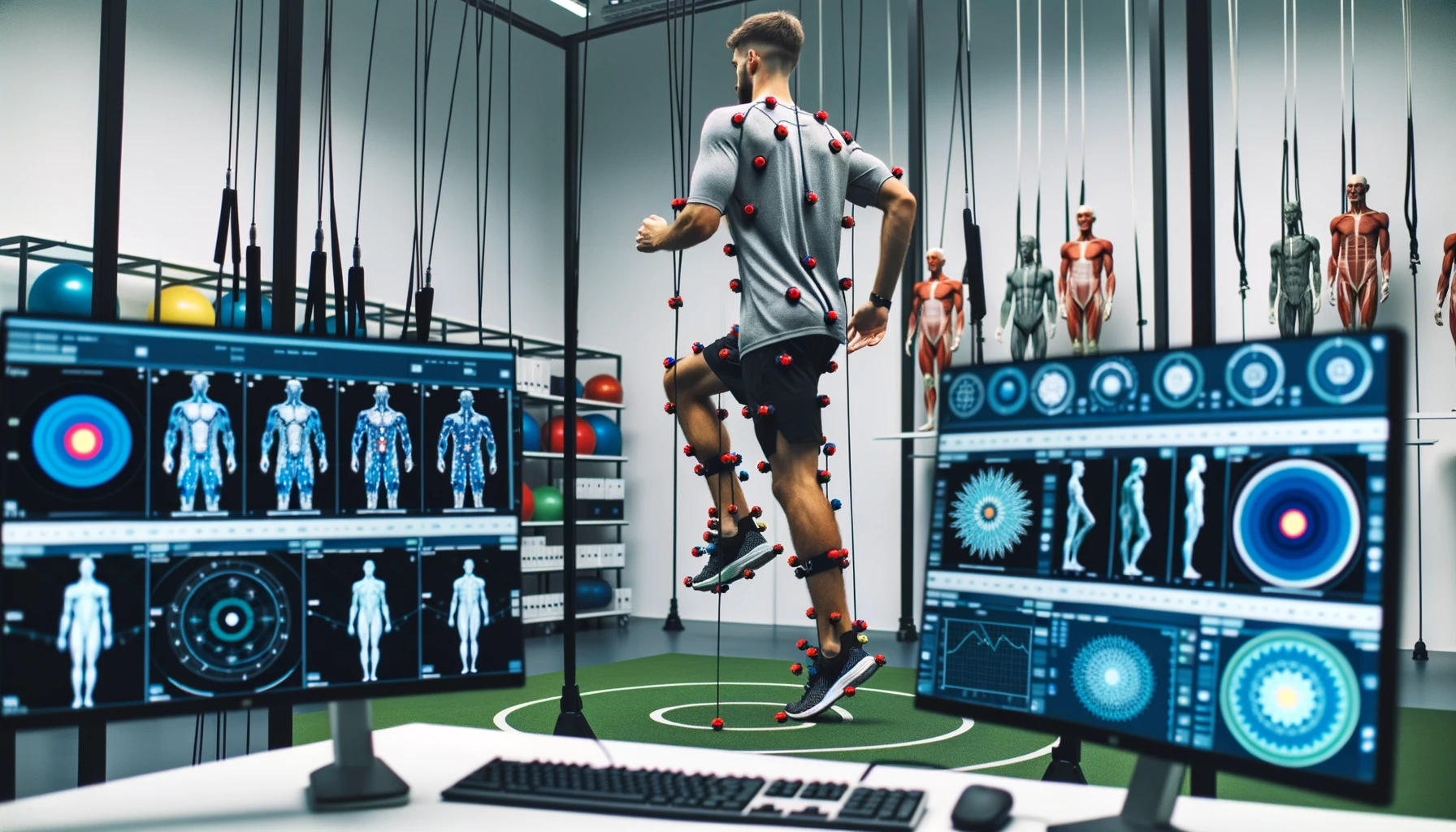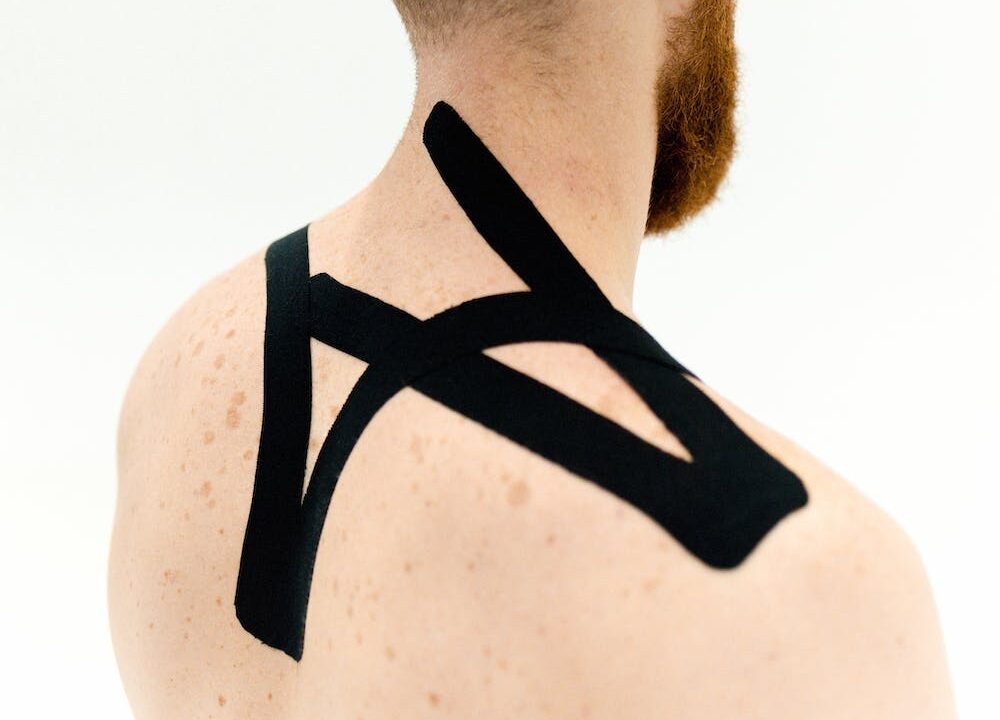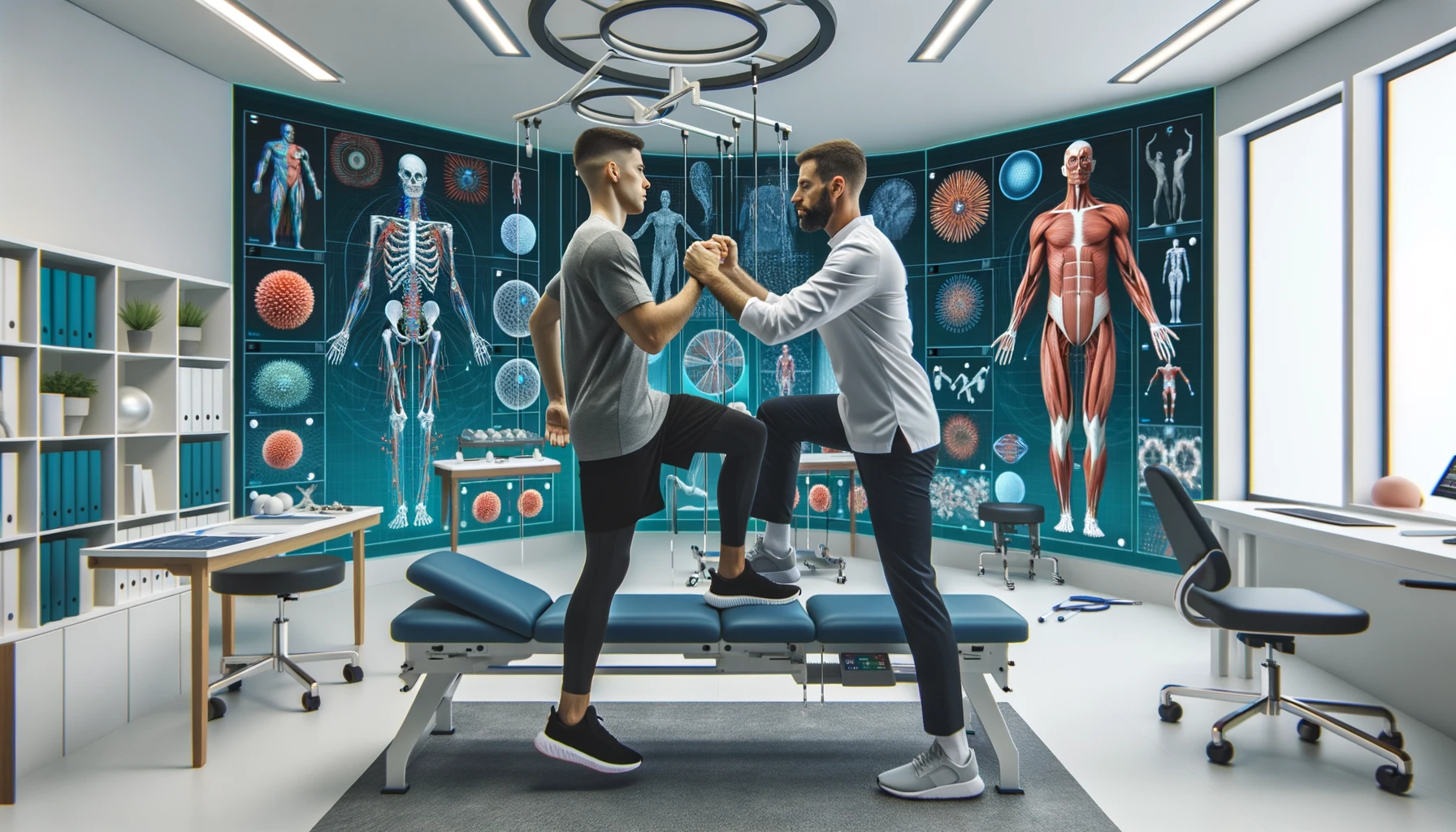
Welcome to our guide on achieving athletic excellence through the application of kinesiology techniques. Kinesiology, the study of the body’s movement, offers a wide range of benefits for athletes looking to optimize their performance and reach their full potential. By understanding the principles of kinesiology and incorporating specific exercises and practices, athletes can enhance their physical capabilities, prevent injuries, and facilitate a safe and efficient recovery process. In addition to its direct impact on athletic performance, kinesiology also provides opportunities for academic success and offers versatile career paths in the sports industry.
Key Takeaways:
- Kinesiology is the study of the body’s movement and can greatly enhance athletic performance
- Understanding kinesiology helps athletes optimize their physical capabilities by focusing on biomechanics and movement
- Specific exercises and techniques tailored to athletes can enhance performance and minimize the risk of injuries
- Kinesiology plays a crucial role in the rehabilitation and recovery process for injured athletes
- Pursuing a degree in kinesiology can lead to academic success and provide versatile career opportunities in athletics
Understanding Kinesiology for Athletes
In order to fully grasp the benefits of kinesiology for athletes, it’s important to understand the role of sports kinesiology and how it integrates with the biomechanics of various sports. Sports kinesiology is the study of how the body moves and applies this knowledge to enhance athletic performance. By examining movement patterns, muscle activation, and joint mechanics, kinesiologists can analyze an athlete’s technique, identify areas for improvement, and implement strategies to optimize performance.
One key aspect of sports kinesiology is the integration with biomechanics. Biomechanics involves the study of forces and mechanical principles applied to the human body during movement. By understanding the biomechanics of specific sports, kinesiologists can provide valuable insights into how athletes can generate more power, improve accuracy, and reduce the risk of injury.
Benefits of Kinesiology in Sports
There are several benefits of incorporating kinesiology into athletic training and performance. By utilizing kinesiology techniques, athletes can improve their overall physical capabilities, enhance performance, prevent injuries, and aid in rehabilitation and recovery.
Through kinesiology, athletes can gain a deeper understanding of their body mechanics, enabling them to optimize movement patterns and improve efficiency. This can lead to increased speed, agility, and power, allowing athletes to perform at their best. Kinesiology techniques can also help athletes prevent injuries by identifying potential weaknesses and implementing targeted exercises and conditioning programs to address them.
Furthermore, kinesiology plays a crucial role in the rehabilitation and recovery of injured athletes. By utilizing specialized exercises and treatments, kinesiologists can aid in the recovery process, helping athletes regain strength, mobility, and function following an injury.
| Kinesiology Benefits for Athletes | Summary |
|---|---|
| Enhanced athletic performance | Optimizing movement patterns and physical capabilities |
| Injury prevention | Identifying weaknesses and implementing targeted exercises |
| Rehabilitation and recovery | Aiding injured athletes in regaining function and strength |
Overall, kinesiology offers a holistic approach to athletic excellence, combining the science of movement with practical strategies to enhance performance, prevent injuries, and promote overall well-being for athletes at all levels.
Enhancing Performance through Kinesiology
To truly unlock your athletic potential, it’s crucial to incorporate performance enhancement exercises and targeted strength and conditioning routines into your kinesiology-based training regimen. By utilizing the principles of kinesiology, you can optimize your physical capabilities and elevate your athletic performance to new heights.
One of the key aspects of enhancing performance through kinesiology is focusing on specific exercises that target different muscle groups and movement patterns. Incorporating exercises such as plyometrics, agility drills, and resistance training can help improve explosiveness, speed, and overall strength. These exercises are designed to challenge your body, stimulate muscular adaptations, and increase your overall athleticism.
Another vital component of performance enhancement in kinesiology is implementing personalized strength and conditioning programs. These programs are designed to address individual needs and goals, focusing on improving muscular strength, power, and endurance. By tailoring these programs to your specific sport or activity, you can enhance your performance in a sport-specific manner.
| Benefits of Performance Enhancement Exercises |
|---|
| Improved muscular strength and power |
| Increased speed, agility, and quickness |
| Enhanced endurance and stamina |
| Reduced risk of injuries |
By incorporating performance enhancement exercises and targeted strength and conditioning routines into your training, you can maximize your athletic potential and take your performance to the next level. However, it’s important to remember that consistency and proper form are key to achieving optimal results. Consulting with a qualified kinesiology professional or athletic trainer can provide you with expert guidance and ensure that you’re following a safe and effective training program tailored to your specific needs.
Preventing Injuries with Kinesiology
Keeping injuries at bay is a top priority for athletes, and through the application of kinesiology, you can incorporate effective injury prevention techniques into your athletic routine. Kinesiology, the science of body movement, can play a crucial role in minimizing the risk of sports injuries by addressing biomechanical imbalances and enhancing overall physical performance. Let’s explore some key injury prevention strategies that kinesiology offers.
One important aspect of injury prevention is understanding and improving body mechanics. Kinesiology helps athletes identify and correct movement patterns that may be causing undue stress on joints or muscles. By studying the body’s natural movements in relation to specific sports, kinesiologists can develop personalized training programs that optimize biomechanics and reduce the likelihood of injury.
Proper warm-up and stretching techniques
Before engaging in any physical activity, it is essential to warm up the body and prepare the muscles for intense exercise. Kinesiologists can guide athletes in incorporating dynamic warm-up routines and specific stretching techniques to increase flexibility and reduce the risk of strains or sprains. These targeted warm-up exercises help to activate the muscles, increase blood flow, and improve joint mobility, ultimately enhancing performance and preventing injuries.
Strength and conditioning for injury prevention
An essential component of injury prevention is building strength and conditioning. Kinesiology provides athletes with personalized strength training programs that target muscle imbalances, improve stability, and enhance overall physical fitness. By focusing on exercises that promote balanced muscle development, kinesiologists can reduce the risk of overuse injuries and strains by improving the body’s ability to withstand the demands of sports activities.
By incorporating kinesiology principles and techniques into your athletic routine, you can take proactive steps towards injury prevention and optimizing your athletic performance. Consult with a kinesiologist or sports performance specialist to develop a personalized injury prevention plan that caters to your specific needs and goals. Remember, prevention is always better than cure, and embracing kinesiology can help you stay on track towards achieving your athletic excellence.
| Injury Prevention Tips |
|---|
| Make sure to warm up properly before every workout or game. |
| Follow a personalized strength and conditioning program to improve overall fitness. |
| Practice proper form and technique in all sports activities. |
| Incorporate stretching exercises to increase flexibility and prevent muscle imbalances. |
| Listen to your body and take rest days when necessary to avoid overuse injuries. |
Rehabilitation and Recovery for Athletes
When injuries do occur, kinesiology can play a key role in the rehabilitation and recovery of athletes, helping them bounce back stronger than before. By utilizing kinesiology techniques, athletes can regain their physical functionality and return to their sport with improved performance and reduced risk of reinjury.
One of the primary focuses of kinesiology in the rehabilitation process is to restore proper movement patterns and address muscular imbalances. Through targeted exercises and therapies, kinesiology professionals can identify and address the root causes of injuries, helping athletes correct movement dysfunctions and prevent future injuries.
In addition to exercise interventions, kinesiology also emphasizes the importance of nutrition and supplementation in the recovery process. A well-designed nutrition plan, tailored to the specific needs of each athlete, can support tissue repair, reduce inflammation, and enhance overall recovery.
| Benefits of Kinesiology in Rehabilitation and Recovery: |
|---|
| 1. Individualized treatment: Kinesiology professionals take a personalized approach to rehabilitation, tailoring treatment plans to the unique needs and goals of each athlete. |
| 2. Improved performance: By addressing movement dysfunctions and imbalances, kinesiology helps athletes optimize their physical capabilities, leading to improved performance on the field. |
| 3. Injury prevention: Through targeted exercises and movement assessments, kinesiology can identify areas of weakness and vulnerability, enabling athletes to proactively prevent future injuries. |
In conclusion, kinesiology has become an essential aspect of the rehabilitation and recovery process for athletes. By utilizing the principles of kinesiology, athletes can not only recover from injuries but also enhance their overall performance and minimize the risk of future setbacks. With its individualized approach and focus on restoring proper movement patterns, kinesiology offers a comprehensive solution for athletes looking to return to peak physical condition.
Academic Success and Kinesiology
Kinesiology programs not only contribute to athletic success but also have a positive impact on the academic achievements of student athletes. By pursuing a degree in kinesiology, students gain a comprehensive understanding of the body’s movement and learn how to optimize physical performance. This knowledge extends beyond the field of athletics, providing a well-rounded education that can complement academic pursuits.
Graduates of kinesiology programs have a wide range of career opportunities available to them. They can become fitness consultants, personal trainers, fitness instructors, athletic trainers, or coaches, to name a few. The skills and knowledge acquired through kinesiology programs can also be applied in physical fitness, physical therapy, occupational therapy, education, sports medicine, and business industries.
In addition to the practical applications of kinesiology in the sports industry, these programs have been found to positively impact the academic success of student athletes. By studying kinesiology, students learn discipline, time management, and goal-setting, which are essential skills for achieving success both on and off the field. The holistic approach of kinesiology programs fosters personal growth and academic achievement, enabling student athletes to thrive in their chosen fields of study.
Kinesiology Program Options
When exploring kinesiology programs, students have the flexibility to choose from various degree options, including associate, bachelor’s, master’s, and doctoral degrees. These programs typically offer a combination of theoretical coursework and practical experience, giving students the opportunity to apply their knowledge in real-world settings.
| Degree | Program Duration |
|---|---|
| Associate | 2 years |
| Bachelor’s | 4 years |
| Master’s | 2 years |
| Doctoral | 4-6 years |
Regardless of the degree level, kinesiology programs provide a solid foundation for a successful career in athletic excellence. Graduates emerge with a comprehensive understanding of the body’s movement, the ability to enhance performance, prevent injuries, and aid in rehabilitation. The continuous evolution of the field necessitates professionals to stay updated on current trends and obtain necessary certifications, ensuring they remain competent in their chosen field.
Kinesiology Careers in Athletics
A degree in kinesiology opens up a range of exciting career paths in athletics, including roles as athletic trainers, coaches, and fitness consultants. As kinesiology professionals, we have the opportunity to make a positive impact on athletes’ lives by helping them optimize their physical performance and prevent injuries.
As athletic trainers, we work directly with athletes to assess, treat, and prevent sports-related injuries. Our expertise in kinesiology allows us to design personalized rehabilitation and conditioning programs to help athletes recover from injuries and regain their strength and mobility. We also play a crucial role in preventing injuries by educating athletes about proper techniques, warm-up routines, and injury prevention exercises.
Coaching is another rewarding career option in kinesiology. As coaches, we use our knowledge of biomechanics and kinesiology to develop training programs that enhance athletes’ performance. We focus on improving their strength, endurance, flexibility, and overall athletic abilities. Our guidance and support help athletes reach their full potential and achieve their goals.
As fitness consultants, we work with individuals and teams to develop customized fitness plans based on their unique needs and goals. We utilize our understanding of kinesiology to design effective exercise programs that improve cardiovascular fitness, build strength, and enhance overall physical performance. By providing ongoing guidance, motivation, and support, we help our clients optimize their athletic abilities and achieve long-term success.
| Career Opportunities in Kinesiology | Responsibilities |
|---|---|
| Athletic Trainer | – Assess and treat sports-related injuries – Design rehabilitation programs – Educate athletes on injury prevention |
| Coach | – Develop training programs – Improve athletes’ performance – Provide guidance and support |
| Fitness Consultant | – Design customized fitness plans – Enhance physical performance – Provide ongoing guidance and support |
With a degree in kinesiology, we have the opportunity to pursue diverse career paths in athletics. Whether we choose to work directly with athletes as athletic trainers or coaches, or apply our expertise as fitness consultants, our knowledge of kinesiology allows us to make a difference in the lives of athletes. By helping them optimize their performance, prevent injuries, and achieve their goals, we contribute to their success both on and off the field.
Staying Current in Kinesiology
In a constantly evolving field like kinesiology, staying current with the latest trends and obtaining relevant certifications is essential for success. As professionals in the world of athletic excellence, we understand the importance of continuously enhancing our knowledge and expertise. By staying up-to-date with the latest research and advancements in kinesiology, we can ensure that we are providing our clients and athletes with the highest level of care and guidance.
One way to stay current in kinesiology is by pursuing relevant certifications. These certifications validate our expertise and demonstrate our commitment to ongoing professional development. Whether it’s obtaining a certification in sports performance, injury prevention, or rehabilitation, these credentials not only enhance our resume but also expand our skill set. They allow us to stay ahead of the curve and offer our clients the latest techniques and strategies for optimal athletic performance.
Another important aspect of staying current in kinesiology is keeping up with the latest trends and research. The field of kinesiology is constantly evolving, with new studies and breakthroughs emerging regularly. By staying informed about current research and attending conferences or workshops, we can stay ahead of the game and integrate the latest findings into our practice. This enables us to provide evidence-based recommendations and interventions to our athletes, ensuring that they are receiving the most effective and cutting-edge care.
By maintaining our knowledge and skills through continuous learning and staying current with certifications and trends, we can position ourselves as trusted experts in the field of kinesiology. This not only benefits our clients and athletes but also opens up new opportunities for professional growth and advancement. As the field of kinesiology expands and evolves, those who are committed to ongoing education and staying current will continue to thrive and make a lasting impact in the world of athletic excellence.
FAQ
What is kinesiology?
Kinesiology is the study of the body’s movement and how it relates to physical activity and exercise. It involves understanding biomechanics, physiology, and anatomy to optimize athletic performance and prevent injuries.
What degrees are available in kinesiology?
Kinesiology offers various degree programs, including associate, bachelor’s, master’s, and doctoral degrees. These programs provide comprehensive education and training in the field of kinesiology and prepare graduates for careers in athletic excellence.
What career options are available for kinesiology graduates?
Kinesiology graduates can pursue careers as fitness consultants, personal trainers, fitness instructors, athletic trainers, coaches, and more. They can also find employment in physical fitness, physical therapy, occupational therapy, education, sports medicine, and business industries.
How can kinesiology programs benefit student athletes?
Kinesiology programs have been found to have a positive impact on student athletes’ academic success. They provide a well-rounded education that complements athletic pursuits and fosters personal growth and academic achievement.
How can kinesiology professionals stay updated in their field?
It is important for kinesiology professionals to stay updated on current trends and obtain necessary certifications in their chosen field. This ensures that they have the most up-to-date knowledge and skills to provide the best possible services to their clients or students.
Are there opportunities for kinesiology graduates in athletic careers?
Yes, kinesiology graduates can find rewarding careers in athletic excellence. They can work as athletic trainers, coaches, or fitness consultants, helping athletes optimize their performance and reach their full potential.



